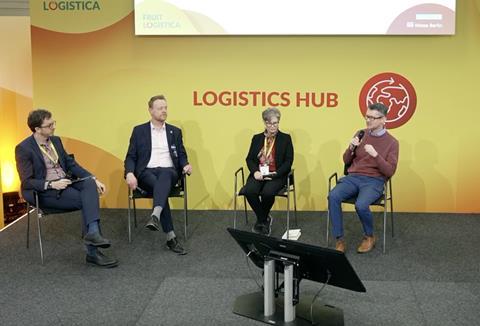The argument for airfreight was put forward on the Logistics Hub stage during day two of Fruit Logistica in Berlin
A discussion took place on the second day of Fruit Logistica in Berlin, making the case for airfreighted fresh produce in the context of net zero.

Simon Derrick, global head of sustainability at Blue Skies, was first to take to the Logistics Hub stage, emphasising the threat of global warming and noting that the responsibility to act fell on everyone’s shoulders.
“Simply put we must all strive to reduce our emissions as far as possible, and as quickly as possible, in order to avoid the worst impacts of climate change which will inevitably effect every single one of us and our future generations” he told visitors.
This had led to a drive towards net zero across the board, but Derrick warned that we needed to be aware and cautious of the unintended consequences of the eco-choices we made.
Examples included the move away from plastic which had led to greater demand for paper and therefore a greater risk of deforestation, or changing to biodegradable or compostable materials which could in turn contaminate recycling streams.
“And then of course there is airfreight,” he said. “We often hear that flying foods can create around 50 times more carbon emissions than shipping.
“But we have to stop and think. How representative is this of the reality? What figures and assumptions are these based on? Quite often there is more to it than we are told.”
Derrick pointed to figures showing that transport of food made up just 1.56 per cent of total global emissions, with just 0.16 per cent of this coming from airfreighted food.
Much airfreighted fresh produce came from Africa, he outlined, which as a continent contributed only 3 per cent of global emissions.
However, the social and economic impact of airfreight on Africa was huge, he said, supporting 5m livelihoods, according to recent University of Exeter research.
”So if we take all of this into account, does the statement that flying food is 50 times worse than shipping really tell the full story?” he pondered. ”And is it therefore morally right for us to be aiming to stop airfreighting fresh produce?”
“That’s the risk, that’s what we are up against, because we are seeing calls to ban airfreighted fresh produce.”
He said the notion of Fair Miles was first introduced by Oxfam and IIED in a 2008 report, and now it was back – not to stop progress towards net zero, but to ensure it was being done in a fair and inclusive manner.
”Today Fair Miles is a growing consortium of organisations, including fresh produce companies, development organisations and universities, looking to answer the question of how we take a fair approach to net zero without stopping vital market access for developing world producers.”
Fair Miles in focus
Derrick was joined on stage by James MacGregor, director at G37 Consulting, and Morag Webb, head of science and policy at Colead, to further discuss airfreight and the Fair Miles concept.
MacGregor said he was looking to communicate the wins of airfreighted fresh produce into the UK and Europe.
These wins included lower carbon emissions, higher global sustainable development, and the collaboration of the entire supply chain to drive better efficiency, sustainability and profitability.
“The most important thing that I’d like to see coming out of Fair Miles is for consumers of fresh produce which has been airfreighted into the UK, Europe and elsewhere to be proud of buying those products and see that as part of their net zero strategy,” he said.
”I’d like to see the companies that are selling to us, the supermarkets and other big parts of the supply chain to equally see airfreight as part of their strategy – not as something that needs to be cut out.”
Webb said Colead, which represented producers and exporters from African, Caribbean and Pacific countries as well as some European importers, had been working to help its members gain access to markets – something that had become more difficult thanks to more stringent food safety and sustainability requirements.
She said it had been disappointing to see the issue of airfreighted produce come to prominence once more, which is why Colead had been keen to get involved at the forefront of Fair Miles again.
“It has been incredibly disappointing to see retailers taking the decision to stop airfreighted produce, and I guess it makes an attractive marketing line,” Webb told visitors. “What we really want out of this dialogue is to get some discussion going, to analyse why it’s not the right thing to do.
”We’ve seen many countries and export sectors make huge strides in accessing global markets, and this decision is based on knee-jerk reactions and not sound data,” she continued.
”We need to look at other ways to address the problem, have most impact and provide most benefit, but not to the detriment of poor and vulnerable producers.
”Some of these producers in Kenya, Ghana and many other places, have no other solutions [than airfreight] and to be targeting them as a ‘quick win’ to show that we are trying to cut carbon emissions is such a wrong thing to do,” Webb added. “They are already suffering the most from the impact of climate change having contributed least to causing it, so there is a strong moral argument that this is not where we should be starting.”



